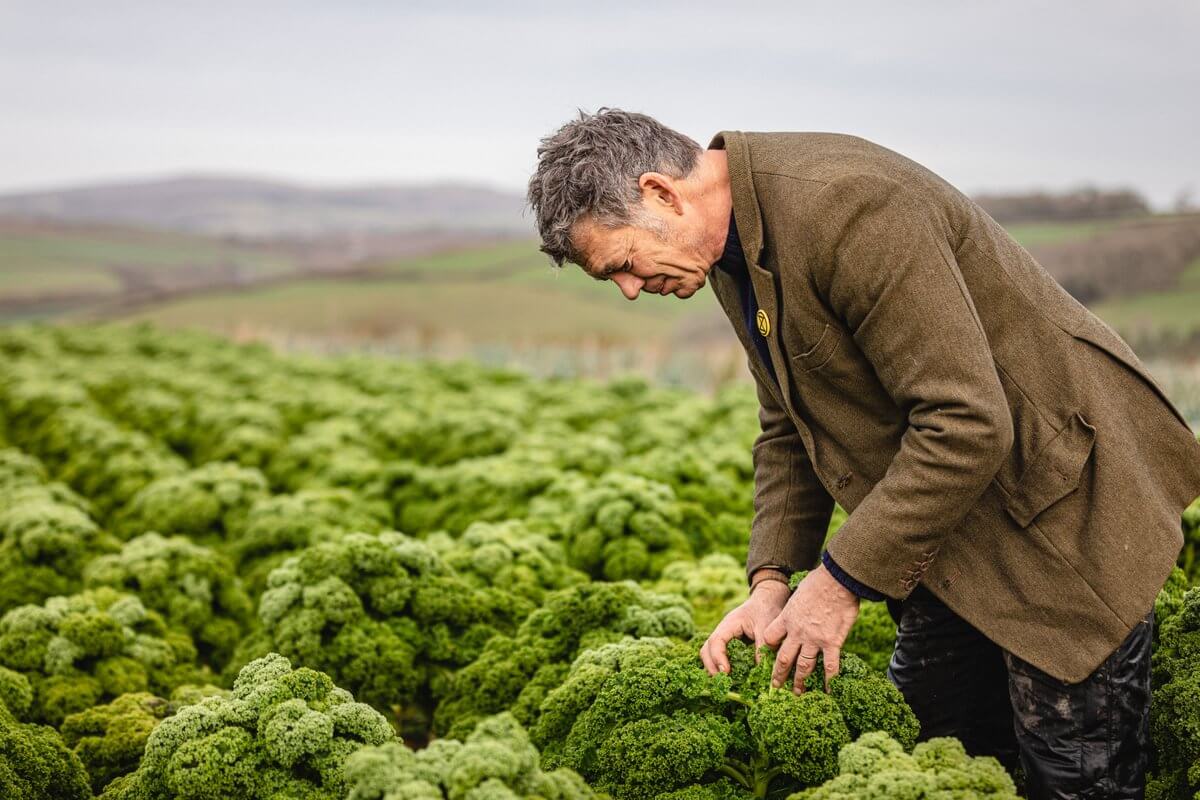The vast majority (84 per cent) of people who signed up to Veganuary in 2019 were female.
That’s acccording to Toni Vernelli, head of communication and marketing at the Veganuary campaign, who was speaking at the Food Matters Live conference last November. She said that just 14 per cent of the 186,000 participants were male, a four per cent increase on the previous year.
So where are all the meat-free men? Is veganism and vegetarianism a female lifestyle? Vernelli went on to explain that she believes this dramatic skew is down to the fact that eating meat is still associated with masculinity.
The Veganuary charity’s survey also found that the number one reason people don’t stick to a vegan diet after the month-long challenge is due to social pressure. Could this be particularly relevant to men? Do men worry about being judged for giving up animal products? Are they embarrassed to show such strong compassion?

Or perhaps it’s to do with strength and the ever prevalent ‘P’ word – protein, which the world only seems to be getting more obsessed with. But protein isn’t just in meat and animal products, and the new Game Changers documentary on Netflix has done its best to challenge the idea that humans need meat to be strong, by showcasing world-class athletes who follow a plant-based diet.
One of those featured is Arnold Schwarzenegger, arguably one of the most iconic people in the world of fitness and strength training. Schwarzenegger explains how his personal health has never been better than when following a plant-based diet, and that we need to move away from our meat indulgent diets.
I would take any Netflix health and lifestyle documentary with a pinch of salt and acknowledgment of the production company having a particular bias or agenda, but regardless of the potentially questionable science, perhaps showing these incredibly strong men and women who are ahead of the competition in their chosen sport is exactly what we need to influence more men to reduce their meat intake.
Perhaps a good time to mention that while it’s true that sustainably-produced livestock has a lower impact, eating less, albeit better quality meat, is still a valid part of the debate.
During her presentation, Vernelli said there has been a 469 per cent increase in the interest of veganism and plant-based foods, according to Google search data. So, while only a very small percentage of people classify themselves as vegan, more and more people are conscious of the need to reduce their consumption of animal products, with around 22 million people in the UK adapting a flexitarian approach.
Perhaps it’s within this 22 million where more men feel comfortable. Environmental concern is now the number one reason that people turn to a meat and dairy free diet, up 10 per cent in the last year, according to Veganuary’s research.
To meet current climate warming predictions, it’s clear that the way we produce and consumer animal products needs to change, and whether it’s following a vegan lifestyle, a plant-based or vegetarian diet, or flexitarian approach, it seems we are moving in the right direction.













I’m on the Carnivore diet and I’ve lost 3 stones on it. My rheumatoid arthritis is better on this diet. The only thing I can’t give up is organic chocolate.
yes you would feel better.
to eat a vegan diet you need to live between the tropics and the Equator.
here in the UK if we only eat like our ancestors, now,. one could have onions,leeks,sprouts and carrots
that is eating locally grown food!
forget bananas, avocados etc…
the ray we get from the sun that set our circadian rythm is key
then that set the circadian rythm of every organs in the body
thats why eating a banana is not right for our body here.
In summer we would eat fruits, but how much ??? i remember
growing berries… i had what birds, squirrels etc… would kindly leave me.
therefore a small intake of sugar . whole fruits, never juices these are pure sugar.
of course in summer there would be a lot more veg available. so of course, ok to eat these.
before following vegan,vegetarian etc… THINK
1st about your health is vegan a great idea, if one has to take many supplements?
look at nature, if you want to learn
no previous tribe has ever been on a vegan diet. there must be a reason:)
Hi Elorac, whatever diet we choose to follow to suit our own health needs, it’s good to focus on the sustainability of how and where the food is grown.
Eurgh. This is disappointing. All I can say is that a man who cares about animals and doesn’t eat them is infinitely more attractive than a heartless, self-indulgent one. The thought of kissing somebody with bits of corpse between their teeth is just gross too. Such a turn-off.
I think a lot of the problem is in the terminoligy – Vegananuary, 469 % – etc. what a load of pointless tosh! At a guess the majority of men not eating meat are too buy not eating the stuff to need to point to themselves and say “I’m a Vegan / Vegettarian / lover of Chilli Ice Cream or any other term that proves, in their own mind, just how important they think they are. Seems from this post there’s a lot fo females who need to show this off (actually there’s a lot, maybe even more, females who like the male of the species are just getting on with not eating meat without the need to crow about it).
So come on people if you don’t eat meat don’t eat it but don’t try to convert others to your ways, the world has had enough of all the so called “do gooders” telling people to be more like them – that used to be called religious persecution. Drop the clever words . . . . . as for not kissing somebody with a piece of corpse between their teeth, in some ways it’s not as bad as kissing somebody burning a piece of weed and inhaling the smoke!
I can appreciate why some people don’t want to eat meat and become vegetarian or vegan but that has to be a personal decision.
But the big issue for me is that many people eat to much meat. We should all try to cut our meat consumption to an average of no more than 150-200g per day. With some meat free days.
Governments can help us achieve this aim by increasing farm animal standards and pushing up the price of meat to consumers – meat should be seen as more of a luxury than a cheap commodity.
I’m an Orthodox Christian and we have four fasting and abstinence periods during the year and every Wednesday and Fridays during the rest of the year when we are on a vegan diet. Good for the soul, the body and the planet so long as one doesn’t go crazy once the fast is over!
Living in the States I have to agree that way too much meat is consumed and it’s definitely not a luxury here
This is a really key point about animal welfare – Organic meat is a good choice and if you do choose to have meat in your diet, ‘less and better’ is a great guideline that will shift support away from poor quality meat and factory farming.
I’m not sure about veganuary – it reduces suffering for a short while, induces a sense of well-being, introduces people to some really good food, but it’s interpreted as a kind of fad.
I know a lot of male vegans. More than female in fact. They were frightened by the impact of animal farming on the climate, they watched Earthlings type documentaries or just became aware of the reality of the majority of farming processes.
I believe veganism will increase as people become more aware of practices because I think most would be too compassionate to keep a sentient, emotionally intelligent animal, for instance in a filthy cage, artificially increasing its weight until it’s ready to experience a terrifying and degrading death process. Or to slaughter new born male – and so worthless – creatures. Or to repeatedly artificially inseminate animals and then repeatedly remove their babies, in the case of cows often within 24 hours. People adore and dote on their pets, yet farm animals experience the same range of emotions so it seems bizarre behaviour to me. (I’m obviously a vegan too.)
However, the biggest issue, because it directly affects the continuation of all life on Earth is the climate emergency, and for this reason I think everyone needs to collaborate and do whatever they can via diet, travel, heating etc to minimise their contribution to the harm that’s being done to our precious planet
Hi Riza, the point you make at the end seems to be really hitting the nail on the head – we all have different views and needs, but finding a more sustainable way forward for everyone needs to be the focus in a time of climate crisis.
Growing up in the ‘male world’ I would agree for men who want to be accepted by their mates there is probably a lot of pressure to conform with those around you. I suppose you could change those around you. I’ve reached an age where I don’t care so much what others think. Be confident strong inside. Like the film/documentary says ‘Feel Rich’ and this is an internal strength and richness.
There is an evangelical zeal about what many say, but so what. We are bombarded all the time by all sorts of people to do or more often have certain things. Look where that has got us. Everybody has a so called ‘agenda’ Without pushing my agenda, I’m glad I started eating wholegrain, plant based food. Partly for me but also for the planet and animals.
There does seem to be a growing awareness that just consuming less has to be embraced – whether that’s meat, buying clothing, shopping as a ‘leisure pursuit’, travel – to even begin to address climate change. You may enjoy this video where Guy Singh-Watson talks about consumerism and choice https://www.youtube.com/watch?v=1RnhnGNe62Q